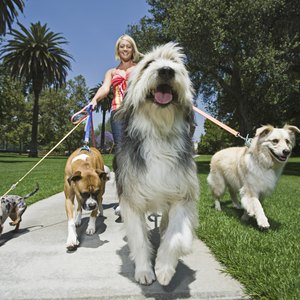
Every day, pet owners leave town for vacations and business trips, or emergencies take them to hospitals or other long-term medical facilities. Someone must take care of Fido and Fluffy, and that’s where professional pet sitters come in. As small business owners, pet sitters can take some of the same tax deductions available to other businesses. These deductions and IRS write offs can help you save a tremendous amount of money during tax season.
Claiming Appropriate Deductions
Some pet sitters watch their clients' dogs and cats in their own home in a boarding arrangement, but the majority travel back and forth to the pet owner’s premises. You can deduct your mileage back and forth to a client’s home, as well as any mileage bringing the client’s pets to the dog park, veterinarian, groomer or other pet service. If you have a home office as your primary base, every trip is tax deductible, including the first and last pet visits of the day. If you work from an outside office, you can’t deduct that first trip out or the last trip back because you then fall into non-deductible personal commuting. With your home office, you are going from one place of business to another place of business – your client’s house. These dog walker tax deductions add up quickly!
For 2018, the IRS permits a standard rate of 54.5 cents per mile for business miles driven. However, if you use the vehicle for both personal and business purposes, you must divide the expenses based on the mileage. If it's a 50/50 use mix, that's your deductible percentage.
If you’re running your pet sitting business out of your home, you likely have a home office. The IRS allows you to deduct pet sitting business expenses for a home office if the space is used exclusively for business, whether you own your abode or rent it. In 2018, the IRS’ simplified option allows you to deduct $5.00 per square foot of the amount of space used for your home office, with a maximum of 300 square feet. The regular IRS option allows you to deduct the percentage of your home used for your business, and may take into consideration your mortgage, utility costs and other related expenses. Your accountant can tell you which option works best for your pet sitting business.
Obtaining Retirement Deductions
Pet sitters need a retirement plan, and just because you’re operating a small business doesn’t mean you can’t make retirement contributions and take allowed deductions. For example, a sole proprietor can make a contribution to a Simplified Employee Pension (SEP) IRA of up to 25 percent of compensation, with a 2017 limit of $54,000 to the SEP-IRA. You can deduct the amount you put into the SEP-IRA up to 25 percent of your compensation on your federal income taxes.
Filing Deductions on Schedule C
The IRS allows you to deduct certain work-related expenses, for which you use Schedule C. If your service has employees, whether salaried or independent contractors, you can deduct the pay they receive. For employees, put this information on Line 26 of Schedule C, and on Line 11 for independent contractors. Since your business requires insurance, that's a Schedule C deduction. If you supply pet food, cat litter and similar items, make sure to keep all receipts as these items are deductible if provided for your clients' pets. Other relevant Schedule C deductions include:
- Advertising
- Business-related travel
- Business-related meals - 50 percent deduction permitted
- Business publication
- Credit card fees for processing client transactions
- Membership in professional organizations
- Office supplies - if used specifically for business
- Legal fees
References
- IRS: Simplified Option for Home Office Deduction
- IRS: Deducting Business Expenses
- TurboTax: Reporting Self-Employment Business Income and Deductions
- IRS: Schedule C: Profit or Loss From Business
- Internal Revenue Service. "Tax Reform: What’s New for Your Business," Pages 3–4. Accessed Oct. 19, 2019.
- Internal Revenue Service. "Tax Reform Provisions that Affect Individuals." Accessed Oct. 19, 2019.
- Internal Revenue Service. "Tax Cuts and Jobs Act, Provision 11011 Section 199A - Qualified Business Income Deduction FAQs." Accessed Oct. 9, 2019.
- United States Congress. "H.R.1 - An Act to provide for reconciliation pursuant to titles II and V of the concurrent resolution on the budget for fiscal year 2018." Accessed Oct. 9, 2019.
- Social Security Administration. "If You Are Self-Employed," Page 1. Accessed Oct. 9, 2019.
- Internal Revenue Service. "Topic No. 554 Self-Employment Tax." Accessed Oct. 9, 2019.
- Internal Revenue Service. "Publication 587 (2018), Business Use of Your Home." Accessed Oct. 9, 2019.
- Internal Revenue Service. "About Form 8829, Expenses for Business Use of Your Home." Accessed Oct. 9, 2019.
- Internal Revenue Service. "Publication 535 (2019), Business Expenses." Accessed March 16, 2020.
- Internal Revenue Service. "Travel, Gift, and Car Expenses," Page 5. Accessed Oct. 9, 2019.
- Internal Revenue Service. "Tax Guide for Small Business," Page 40. Accessed Oct. 9, 2019.
- Internal Revenue Service. "Retirement Plans for Small Business (SEP, SIMPLE, and Qualified Plans)," Page 2. Accessed Oct. 9, 2019.
- Internal Revenue Service. "Retirement Plans for Small Business (SEP, SIMPLE, and Qualified Plans)," Page 18. Accessed Oct. 9, 2019.
Writer Bio
A graduate of New York University, Jane Meggitt's work has appeared in dozens of publications, including Sapling, Zack's, Financial Advisor, nj.com, LegalZoom and The Nest.

